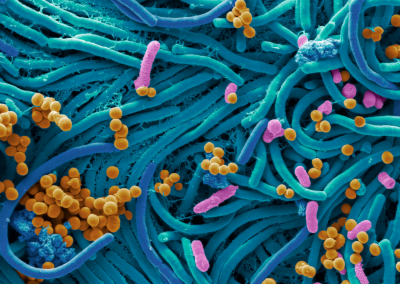Free
60mins
NUTRITIONAL ADEQUACY OF PLANT BASED DIETS FOR KIDS
Vanessa Clarkson RNutr
NUTRITIONAL ADEQUACY OF PLANT BASED DIETS FOR KIDS
Vanessa Clarkson RNutr
Free
60mins
CONTENT AND LEARNING OBJECTIVES
CLEAR UNDERSTANDING OF:
- Why plant based eating is supported by evidence and recommended by public health and environmental organisations
- What variations exist in the spectrum of plant-based dietary patterns
- What issues may arise with some plant based eating patterns in childhood and adolescence
- How to ensure adequate and optimal nutrition when relying on plants for most nutrition in the younger years
BE AWARE OF:
- Ages and stages that present considerations for dietary advice
- Impacts and mitigation of reduced mineral bioavailability in plant foods
- Occasions when supplements are warranted
- Helpful references for further reading
BE ABLE TO:
- Confidently advise parents and children of the benefits of plant based eating for the health of people and planet
- Tailor your advice according to the level of plant consumption, from omnivorous through to vegan dietary patterns
Please note, webinars are not intended to be used by non-medically qualified individuals or as a substitute for, or basis for any medical treatment.
Help us to continue providing expert nutrition learning
If MyNutriWeb has helped you deepen your knowledge of dietary and nutritional subjects, join us to help support and educate people to eat well for themselves and the planet. Read more...

Expert speaker
Vanessa Clarkson RNutr
Public Health Nutrition & Food Systems Consultant
B.Sc., Dietetics, M.Sc., Food Policy
Vanessa has over 15 years’ cross-sector experience working with government, public agencies, academic institutions, and food businesses. She is a published author, with her award-winning first cookbook – ‘Real Food for Babies and Toddlers’ providing practical advice and recipes on plant based eating. Vanessa is working on her second book on plant based eating before, during and after pregnancy, due to be published in 2021.
WEBINAR HOST AND MODERATOR
Tanya Haffner, MD RD Nutrilicious.
Q&As
Supplements: Omega-3 / Algal supplements
What is the omega-3 algae source mentioned in the presentation? Would you recommend algae oil as long chain PUFAs? Are algae just as good as oily fish? What are your thoughts on algae-based supplements to help meet requirements for essential fats?
Long-chain fats are a complex, and still not well-understood area with regards to plant-based diets. While we know the shorter chain fatty acids alpha-linolenic (omega-3) and linoleic acids (omega-6) are essential, and the body uses these to manufacture longer chain fats including (but not limited to) eicosapentaenoic acid and docosahexaenoic acid (omega-3s), the amounts of long-chain fats in diets that do not include animal-source foods, and oily fish more specifically, will be minimal, if not absent entirely with plant only diets.
And yet, studies with vegans and vegetarians are not suggestive of any functional impact of excluding sources of long-chain omega in their diets, despite the conversion of the short to long-chain fats being appreciably low. Indeed, vegetarians are at a lower risk of cardiovascular disease than omnivores, despite an absence of fish in their diets. Furthermore, investigations into algal oil supplementation in adults (a concentrated plant source of long-chain fats) have found adverse effects on lipid profiles in adults, and a recent review of this area is not forthcoming with recommendations to include these supplements for plant-based diets with limited intakes of long-chain omega-3 fats.(1)
It is also worth mentioning as I did not cover this, that there are known sex-differences in the metabolism of long-chain fatty acids, with pre-menopausal women being much more effective at this than men. It is postulated that this difference may have a functional purpose in women of reproductive age to support adequate provision of long-chain fatty acids to the developing foetus during pregnancy and thereafter through breastmilk.(2)
Given importance to cognitive development, if a child's starting point is less long chain omega 3, would you advocate supplementation for 12 weeks? and then maintain with diet?
I’m not aware of any evidence to support this protocol. See above answer for considerations around algal supplements.
Supplements: Iodine, vit B12 and vit D supplements
Iodine. Would you recommend an iodine supplement for all vegans? What would you recommend for very young children who are not able to take the VEG 1 supplement?
Iodine is available in some fortified products and seaweeds, so I wouldn’t generalise that all vegans need an iodine supplement, as it is theoretically possible to meet requirements without. That said, it is the position of several dietetic associations is that iodine supplements are warranted for children consuming plant only diets.(3,4)
According to the Vegan Society, a quarter/third of a crushed tablet can be mixed into food once a day and offered to 1-2-year olds, with the remainder disposed of.
3. Melina, V., W. Craig, and S. Levin, Position of the Academy of Nutrition and Dietetics: Vegetarian Diets. (2212-2672 (Print)).
4. British Dietetic Association – online. Iodine: Food fact sheet. May 2019. Available at: https://www.bda.uk.com/resource/iodine.html
Vitamin B12. Is vegan vit B12 synthetically made i.e. without using bacteria? If bacteria are used to produce vegan vit B12 – then this cannot be classes as vegan?
B12 is made using bacteria but is considered vegan by all vegan groups that I am aware of. Bacteria have no central nervous system and are therefore not considered to be sentient. Humans inadvertently swallow millions of bacteria every day, regardless of their dietary pattern, and there’s nothing we can do about that vegan, or otherwise. Indeed, such bacteria are essential to human survival, and those bacteria that survive through the GI tract depend on humans for survival in a symbiotic relationship. Short guide to animal ethics here.
Vitamin D. Which form of vitamin D (non-animal sourced) are suitable for vegans - any supplement recommendations?
Vitamin D exists in two forms, D2 (ergocalciferol) and D3 (cholecalciferol). There is good research that D3 is more effective than D2 however D3 is not available from plant food sources (D3 is derived from lanolin, the waxy material in sheep’s wool). Vegans will need to supplement with vitamin D, and although I can’t make specific recommendations around brands or manufacturers, there are now vegan D3 supplements available on the UK market.
Safety of supplement use
Are there any studies to back up the safety of children supplementing with vitamins not found in plant-based foods?
There are many studies that look at the safety of supplements in children. Consider too that the specific supplements I speak of in the webinar are for nutrients ordinarily found in foods in omnivorous diets, and amounts are usually in line with requirements. This may not be the case with other herbal supplements, or preparations, that are less rigorously studied.
Other supplement queries
Is there a good vegan supplement that you would recommend for vegan female teens?
We cannot recommend specific supplements. Strongly recommend contacting the Vegan Society for recommendations and/or your health professional.
Practical implications of plant-based diets in children:
Changing behaviour
How can we get young children (e.g. 2-3-year-olds) to eat more veg and legumes?
Infants and young children learn through repeated exposure to foods, regardless of what those foods are. I would recommend reading some of Julie Mennella’s work in this space. Her work has really expanded our understanding of this formative period.
Affordability & accessibility for all
Is a plant-based sustainable diet affordable and accessible for all? Looks like some pricey foods need to be used as well as more food preparation time, skill and knowledge are needed. My concern is with children whose primary caregiver has neither time, resources nor knowledge to achieve these. Any comment?
Plant foods are generally more affordable (money-wise) than animal-source foods and I think we have reached a stage with our understanding of food systems that ‘cheap’ animal-source foods are a fallacy and cost us somewhere else in the system, such as animal welfare concerns, deforestation, excessive greenhouse gas emissions associated with high meat consumption and so on.
I do, however, agree that a dietary pattern based on high quality foods, usually involves more preparation at home and therefore requires more time on behalf of the caregiver. There are ways to circumvent and manage this of course (many do) and part of the role of dietitians is to support people to find ways to incorporate more whole plant foods in the diet.
At the outset of the webinar I did mention briefly that we will not achieve healthy and sustainable dietary patterns through consumer behaviour alone, systems will have to change to accommodate and enable such diets, which would include people’s way of lives. However, I do not expect dietitians can solve all these issues within their roles – there are limits and constraints within which people can adopt changes, as dietitians know all too well.
Eating the variety needed in a plant-based diet is often made difficult due to large vegetable pack sizes in supermarkets, another issue that needs addressing?
There are many issues with supermarket practices that are not conducive to supporting salutogenic dietary patterns (I say this having led the nutrition functions in supermarkets in the UK and Australia and having previously consulted widely for them).
The limited variety and pack sizes are reflective of the needs of the system that feeds into the supermarket to be standardised, specialised and consolidated. The loss of biodiversity on the planet and in our diets is a huge problem, but sadly (and rather pessimistically) I think we are looking in the wrong place, if we are expecting supermarkets to transition their practices to accommodate the biodiverse, seasonally-aligned dietary patterns, that would be beneficial for planetary health (people and planet).
Changing school food standards
What changes would you like to see to school food standards, which are currently under review in England, to take into account plant-based diets for children and supporting sustainability?
I should preface this answer by emphasizing my point that what food on offer is only part of the way to transition to healthy and sustainable food systems. Consideration should also be given to ensuring a ‘values based’ supply chain that feeds into the school food system, one that reconnects schools to their local food economy. Easier said than done – I know this first-hand as I’m working on a circular school food program in Australia at the moment!
The short answer is incorporating more seasonally available plant foods into dishes, and giving schools proper budgets to employ chefs to prepare delicious, and appealing foods.
Misconceptions
Some parents feel pressure to swap to vegan diets. But is there anything nutritionally wrong with meat? How can we help parents not to feel vegan is the only option?
It’s a real shame if anyone feels any sort of pressure to adopt a particular sort of diet. There are legitimate reasons (ethical and environmental) to adopt a vegan eating pattern and if people wish to do that, I don’t think it is appropriate to try to convince people to include animal-source foods against their wishes.
I do, however, think that there are big differences from one vegan diet to another, and it is a dietitian’s role to support the adoption of healthful plant-only eating patterns, if that is the wish of the client.
If someone is excluding animal-source foods on health grounds, I would clarify to the client that animal-source foods, including meat, are nutritious, and they have been essential to survival for the most recent part of human history. These foods can be included within a healthful dietary pattern – but they don’t make a healthful dietary pattern. That is not the job of a single food or food group.
Plant-based drinks
What is the suitability of plant-based drinks for children with regard to bioavailability?
The UK government recommends that calcium fortified, unsweetened plant-based drinks can be used for healthy children with normal growth and development from one years onwards. https://www.nhs.uk/conditions/pregnancy-and-baby/drinks-and-cups-children/
Bioavailability of calcium (calcium carbonate or tri-calcium phosphate) in plant-based drinks although slightly lower than that of dairy milk (calcium lactate), the difference is biologically insignificant. Most plant-based drinks are also fortified with vitamin D which will assist with calcium bioavailability.
Iodine/seaweed safety
Given that hyperthyroidism is a rare but serious disorder in childhood. Would opting for seaweed where the content is highly variable and has been shown to induce excess be problematic? Particularly when kelp and seaweeds are not currently recommended to improve iodine in deficient adult populations?
Whether or not a child needs an iodine supplement, depends on mainly on whether they include fish and/or dairy products in their diet. I agree that it could be problematic, and I do not recommend it – it is challenging to ensure adequate iodine from non-brown seaweeds, and their iodine content is variable.
Is iodine excess an issue?
Iodine excess is generally not an issue for children in the UK. See COT statement.
CPD CERTIFICATE & LEARNING MATERIALS
Applications for CPD approval have been made to the British Dietetic Association (BDA) and the Association for Nutrition (AfN).

Once you have viewed a full recorded webinar the mynutriweb team will review and arrange to send you your certificate via email from hello@mynutriweb.com within two weeks of viewing the webinar.
This webinar is kindly supported by the science & nutrition team at Alpro Alpro UK are committed to helping everyone to enjoy eating well for health & planet.
Alpro UK are committed to helping everyone to enjoy eating well for health & planet.
Alpro has dedicated web pages created for health professionals committed to plant-based sustainable resources
Please note, approval of each sponsor and activity is carefully assessed for suitability on a case by case basis. Sponsorship does not imply any endorsement of the brand by MyNutriWeb, its organisers, its moderators or any participating healthcare professional, or their association. Sponsorship funds are reinvested into the creation and promotion of professional development opportunities on MyNutriWeb.
Popular Now

The Microbiome of IBD and CD

Nutrition and Cancer Myths Debunked

Yakult Science Study Day
Feature in a Webinar
Webinar guest experts encompass topics relevant to all professionals and change agents in food and health, across all health and business sectors.
Would you like to feature in a webinar, or propose a guest expert?
Sponsor a webinar
MyNutriWeb offers organisations and brands an opportunity to sponsor topics, gaining valuable insights into the viewpoints of professionals within a moderated environment. If there is a topic that you would like to support please get in touch to discuss.
This website is intended only for students or professionals working in food, nutrition and health. If this is you, please click to continue.



